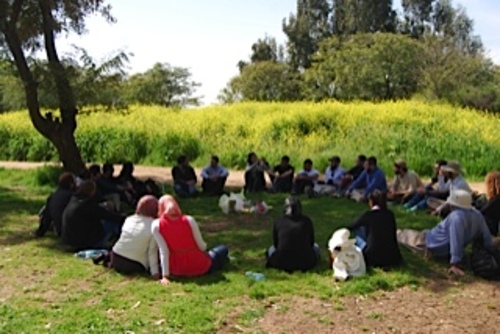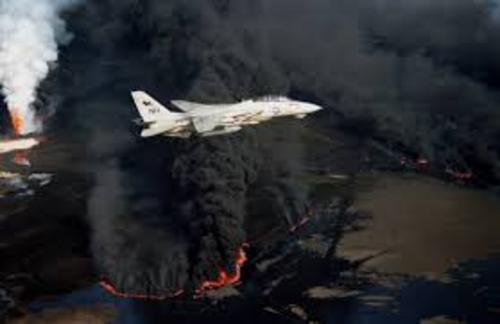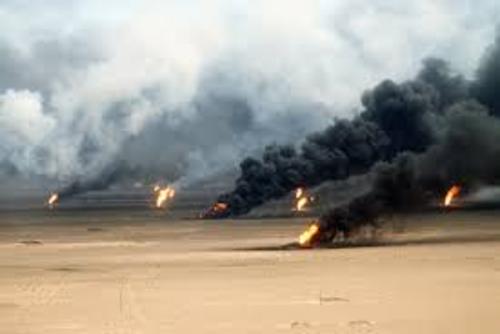What are the biggest obstacles to living sustainably in harmony with both nature and other humans? Maybe climate change, reducing biodiversity loss, and not treating the oceans like a common sewer. Or eliminating disease, as the Bill and Melinda Gates and Zuckerberg-Chan Foundations are focusing their billions on. All of those matter, but none will be a sufficient long-term solution without significantly reducing war, violence, and military spending. Because the cost of war, economically, environmentally, and to quality of life, is tremendous. Since material resources are finite, devoting so much of our energy and money to military spending trades off with what we invest in promoting sustainable societies.
While violence of all kinds takes a toll, in war, we don't just kill other human beings. We also destroy the forests and fields and crops and water they rely on. We drop bombs, set fires, plant explosive devices, and cause oil spills, and the environmental devastation that follows remains even if peace can be negotiated.
According to the Stockholm International Peace Research Institute, global military spending in 2015 totaled $1.67 trillion dollars, which is such a big number that my iPhone calculator doesn't even go that high! So how does this compare to spending on faith and ecology, a critical area of work that is harnessing the collective wisdom of the world's religions to promote a sustainable future? I estimate that in 2015 the total amount spent on efforts in faith and ecology globally was around $35 million. That means that for every $1 spent promoting sustainable living based on faith teachings, about $500,000 are spent on weapons or soldiers. That's a 500,000:1 ratio in favor of military spending. For example, just one 'Fifth Generation' F35-C fighter plane costs $116 million (not including the engine). I contrast military spending with work on faith and ecology between the two are polar opposites-- the former stems from fear and results in ecological destruction, the latter arises from trust and leads to ecological cooperation. We're quick to accept that as the price of war, but hesitant to consider the costs of investing in peace.
Even with those exorbitant costs, military spending is only a fraction of the cost of violence. The Institute for Economics and Peace published the 2016 Global Peace Index, which stated that violence cost $13.6 trillion last year. You might say, this military spending is needed to fight terrorism. But most military spending isn't for that purpose--like the U.S. developing the next generation of nuclear weapons and fighter planes, or China building up its navy or Russia its submarines.
War and the ensuing environmental impact is intentional destruction of the most preventable kind. For example, when Saddam Hussein pulled out of Kuwait in 1991, he set fire to hundreds of oil wells, which then burned for months. Time Magazine listed this as one of the top ten environmental disasters of all time, citing the profound impact of heavy black soot spewing from the fires on humans, livestock and other animals, the land, and into the air. In addition, the Kuwaiti Oil Minister estimated that "in terms of total oil spilled, between twenty-five and fifty million barrels of unburned oil from damaged facilities pooled to create approximately 300 oil lakes, that contaminated around 40 million tons of sand and earth."
In light of how destructive we can be, it is not coincidental that the most environmentally specific command in the Hebrew Bible is not to cut down fruit trees in wartime. While the rabbis of the Talmud understood this as a prohibition against waste also in times of peace, that the Bible singles out how we behave towards trees during war tells us just how fundamental good stewardship of nature is to ethical behavior.
We don't have to imagine the ecological consequences of war, or look back in history to see the damage. An Insight on Conflict report published in 2014 already detailed the environmental impact of the Syrian regional war, and two years later, it's only gotten worse. "This war leaves behind a toxic footprint resulting both directly and indirectly from military origin contamination, such as by heavy metals in munitions, toxic residues from artillery and other bombs, the destruction of buildings and water resources, the targeting of industrial zones and the looting of chemical facilities. The scale of military activity in Syria over the past three years suggests that contaminants and indirect pollution will have a long-term toxic legacy for the environment and can contribute to widespread public health problems for years to come." In the past weeks the Russians and Syrians engaged in the most intense bombing in Aleppo's history, deepening the war in Syria and its impact on people and planet.
We must do more than wring our hands and shake our heads in despair. As descendants of hunter-gatherers, we are programmed for fear, anxiety, and scarcity, which are among the root causes of military spending and war. Anger, power, control and domination are other negative inclinations that left uncorrected lead to ruination. At the current level of soul awareness many people find themselves in a place of fear or hatred or even violence. In order to transition to a sustainable and peaceful society we will need to move to higher levels of soul awareness. This is where religious teachings come in.

(Photo of Jews and Muslims discussing ecology and faith at the site of a past battle of Jews and Muslims)
The Prophet Isaiah taught, 'Nation shall not lift up sword against nation, nor shall they learn war anymore.' It is high time that we heed this teaching.
We must find ways individually and collectively to address what Martin Luther King, Jr. called "the giant triplets of racism, extreme materialism, and militarism" (April 4, 1967). As he said, "Our scientific power has outrun our spiritual power. We have guided missiles and misguided men." To start, we could look at the Global Peace Index report's chapter on 'Building Positive Peace: Recommendations for Systemic Change,' which provides practical suggestions on steps societies can take to promoting peace. In this U.S. election season, we could begin by challenging the bipartisan consensus that U.S. military spending should remain at its current epic levels.
This is our most urgent task, to meet the challenge of living both sustainability and spiritually aware on this planet. We are aided by the forces of good, as Rabbi Abraham Kook taught, "The harmonic call...the voice of peace is much greater than the voices of war that are heard from all the places of emptiness..." As Aleppo burns, I pray and plea for peace on this planet.
Photo credits; Wikipedia, and Gundula Madelaine Tegtmeyer


